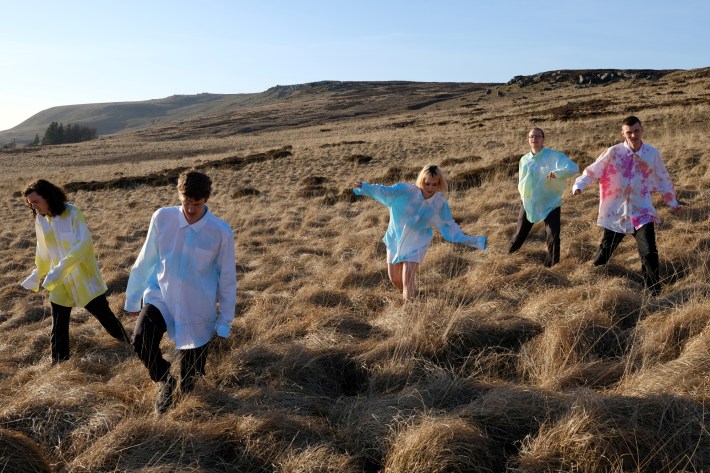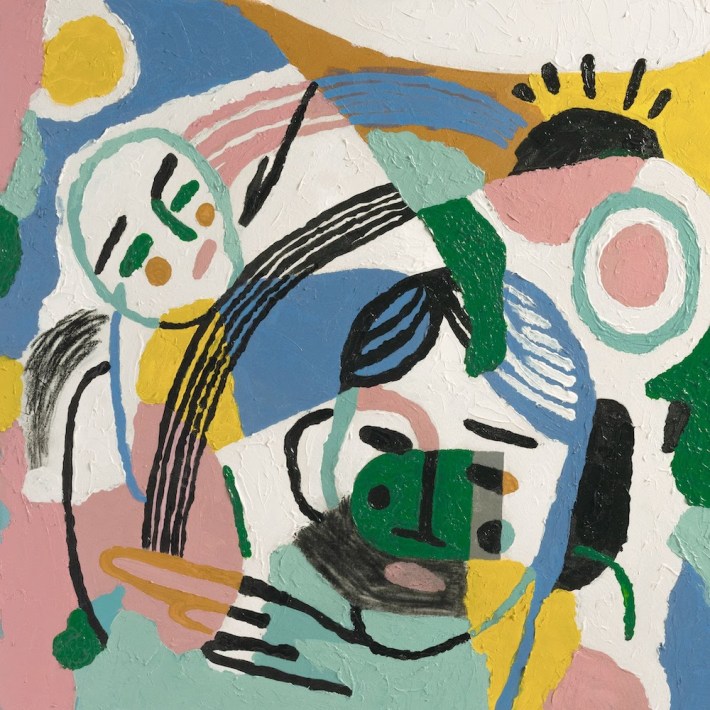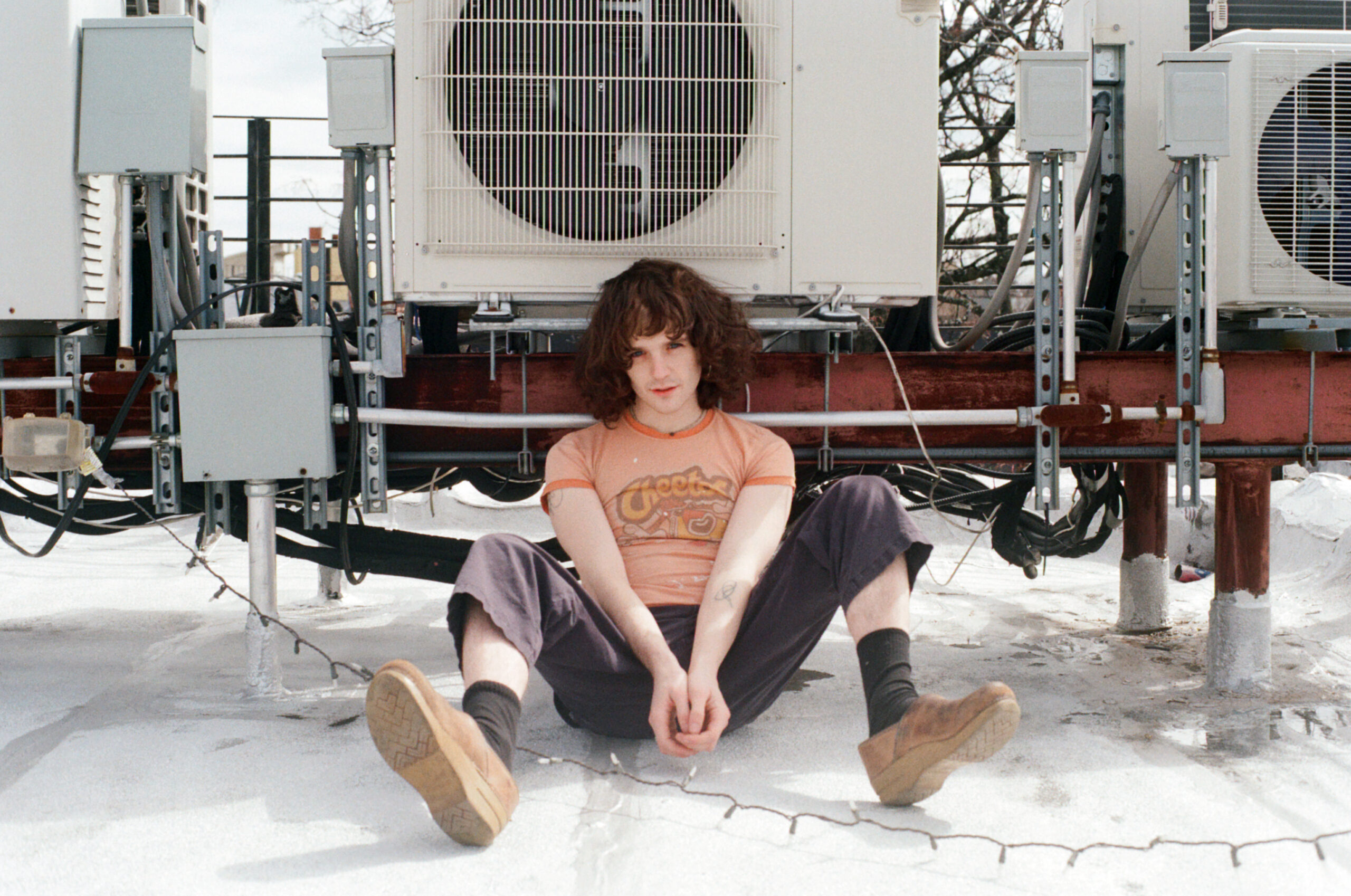W.H. Lung don’t fit in, and they’re fine with it. “We’ve not really found our place,” singer Joe Evans says, with far more acceptance than you’d usually hear in such a statement.
The Manchester, UK-based five-piece point to the London rock and punk scene, which they admire but feels “very southern,” while their make-up as a live band sets them apart somewhat from the dance music culture in their native city, a scene that’s heavily inspired their new album, Vanities. It’s in these melting of worlds, though, that real magic can be found. By not fitting in, you can sound like little else out there.
W.H. Lung -- whose core-songwriting duo of Evans and multi-instrumentalist Tom Sharkett met at school and have been playing in bands together ever since -- emerged out of Manchester in 2019 with debut album Incidental Music, a record of sweeping expansiveness that also often locked into a danceable groove. Highlights such as “Second Death Of My Face” sounded like a krautrock-y take on LCD Soundsystem. After the record gained significant buzz in the UK, the band could’ve easily ridden the wave through to a sophomore record that capitalized on the debut’s biggest and best moments in a subtle but sure progression. But, as they said in a statement announcing Vanities, “We were 100% sure on it not being Incidental Music part 2.”
What came from their total recalibration is a new record that takes the dancier flirtations of their debut and melts them down into bonafide bangers. If Incidental Music saw the band playing the long game, on Vanities they go straight for the throat. First single “Pearl In The Palm” is thrust forward by a propulsive, gurgling synth line, before Evans’ soaring vocal line in its chorus adds euphoria to the hip-shaking.
To soak up inspiration for the new album, the band threw themselves into the storied nightlife of their home city. The club their nights out often centered around was the White Hotel, an old car garage in the bordering city of Salford, which melts into Manchester on its western borders. “It feels completely lawless in there,” Sharkett smiles over coffee on London’s Hampstead Heath, just down the road from Evans’ new home and a pit-stop on the band’s journey from Manchester to the End Of The Road Festival in the southwest of England, where they’ll make their live return the following week. He lauds the inclusivity at the heart of the club’s bookings, and the melting pot of cultures and backgrounds that meet inside its walls. In the same area, a pub called the Derby Brewery Arms is gaining an unlikely reputation as a home for the city’s forward-thinking dance scene. “They’re starting to call the area the Strange Quarter,” Sharkett laughs.
Those in the US -- or even as close as London -- can often see Manchester as a city still living off the glory days of the ‘90s, when the Haçienda and Factory Records made the northern city the best place to go clubbing in the world. For W.H. Lung, a new Manchester exists, and one that hasn’t gotten its dues yet. “People say that Manchester is very nostalgic, which I really don't think is true,” Sharkett says. “I think it’s very forward-thinking. It has new ideas, new thinking, new ways of putting events on, and a new energy.”
From these hedonistic nights out came a deep appreciation for the community and euphoria of Manchester’s nightlife, and clubbing in general, one that Sharkett and Evans took with them when they moved to local town Todmorden -- located in the picturesque Peak District, between Manchester and Leeds -- to write Vanities. The hub of the small town, affectionately nicknamed “Tod” by locals, is a venue and pub called the Golden Lion, which has become an unlikely touring stop for international DJs coming to the UK, all thanks to its effervescent landlords and bookers, Richard Walker (also known as Waka) and Matthanee Nilavongse, AKA Gig.
“They’re the reason it’s absolutely magic,” Evans says with a grin, rolling off a list of unlikely stars the pair managed to tempt to the small Yorkshire town. One gig that stands out in particular to the pair was played by the late, great Andrew Weatherall, the DJ who brought together rock and rave like no one before, most famously in his production on Primal Scream’s Screamadelica.
“Us moving to Tod was definitely a ‘right place, right time’ situation,” Sharkett says. “Our flat was a hundred yards from the Golden Lion, so on nights out, we’d be dancing in the club, then nip back to the flat to dance on the tables to Robyn for a bit, and then go back out.”
“It feels celebratory,” Evans picks up, speaking of the dance music culture in the north of England at the moment. “Celebrating anyone and everyone's identities, anyone's mode of expression. We wanted to infuse the album with a bit of that celebration, because there was a lot of it around us at the time.”
When heading into lockdown along with the rest of the world early last year, the thud of nightclubs was still ringing in the pair’s ears and feeding their creative process, despite the somber alone time in which the new album was actually created. “We had a point of taking stock of all the influences and experiences we had taken in,” Sharkett says.
“We’d been infused by it,” Evans agrees. “We’d collected the resources.”
This energy and enthusiasm is infused deep within Vanities, a record that could tempt even the most jaded raver back to the dancefloor. Highlight “Ways Of Seeing” is an ‘80s-indebted synth-rock stomper, with lyrics being lifted from a poem Evans wrote previously. “ARPi” is the clearest you see the influence of the house music the pair were soaking up, albeit with conversational vocals and beautiful harmonies laid on top. A number of styles might be evident across Vanities, but it’s the celebratory nature and unrelenting energy of the dancefloor that defines the album, one that they’ve captured and transported onto the album impeccably.
“You go through phases where music is really, really exciting,” Sharkett says. “It's like the thing that you had when you were younger, when you first heard the Velvet Underground. You think, ‘I’m obsessed with this, and I won't be more obsessed with anything else ever.’ And then something else comes along, and it continues. The last two years has been that feeling constantly for me. There’s so much music I’d never heard before, and I was so excited by all of it.”
When not on the dancefloor, Evans took to meditation, a practice that’s allowed him to completely revamp his lyric writing, and one he speaks of with reverence. “I just felt in a really good place,” he says now. “It was interesting to note that writing can come from suffering, but it can also come from creating the space within yourself to let pain out and not judge it. So when I say in the promotional material for the album that I was in a good space, that's not to say it's all lyrics about how I'm running through a field feeling absolutely great. It’s about allowing yourself the space to see those more uncomfortable sensations come through and remove the hand that says ‘take that away.’”
“I went on a bit of a journey with this album,” he adds. “Each song explores a different area, and it was a case of letting myself into all of these areas without putting judgement on that. With [closing track] 'Kaya,' I’d never written a song explicitly about a breakup before. 'Pearl Of The Palm' was about how to navigate conscious relationships. On 'Somebody Like,' I was writing about how to love yourself as a person. That’s not something that you see often in contemporary songwriting.”
As a result, Vanities mixes instantly appealing, sugary dance-infused music with a deep-thinking heart. Once you’ve let it take you away on the dancefloor, it works just as well for closer emotional interrogation.
“It might be that it takes a bit longer to bring this to a wider crowd, but that’s cool,” Joe says. “Maybe we’re not supposed to find our place just yet. At the moment, we’re in this in-between space, or outside space. It’s cool what’s going on on the inside, but sometimes you’ve got to make your own space yourselves.”

Vanities is out 10/8 via Melodic. Pre-order it here.







